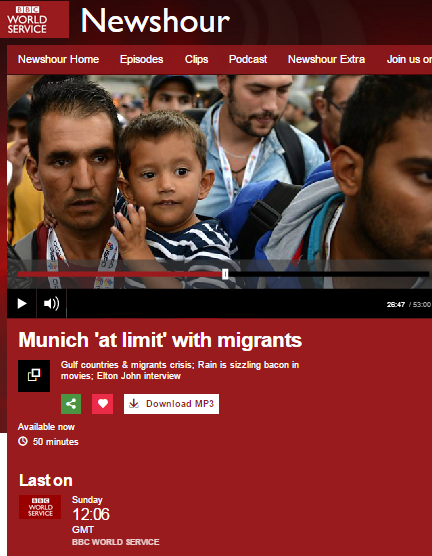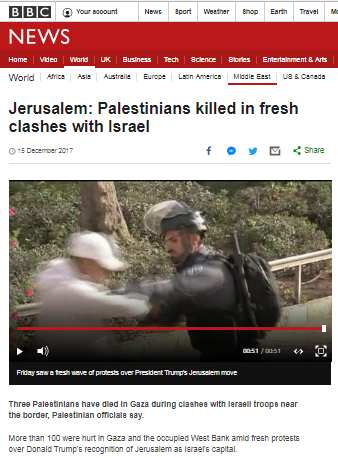An article headlined “How tech is bringing Israelis and Palestinians together” appeared in the ‘features’ sections of the BBC News website’s ‘Middle East’ and ‘Business’ pages on the morning of April 30th. Written by Melissa Jun Rowley, most of the article focuses unremarkably on various “technology partnerships” but some interesting framing is also in evidence.
Paragraph three of the article tells readers that:
“…Israeli-Palestinian relations have been relentlessly grim ever since the foundation of Israel in 1948 and the subsequent Arab-Israeli conflict that has been rumbling on ever since.”
The word subsequent of course means “coming after something in time” but “grim” Israeli-Palestinian relations and the Arab-Israeli conflict of course did not commence following – and as a result of – “the foundation of Israel in 1948” as Rowley’s framing suggests.
Another notable point concerns some of the six images used to illustrate the article. Three of the photographs show people who participate in some of the programmes it features. One is a video first published by the BBC in December 2018. One is an image of torn Palestinian and Israeli flags captioned “In a fractured land, many young people from opposite sides never meet each other”. The final image shows buildings (in Givat Ze’ev, but readers are not given the location) with the caption “Israeli settlements in the occupied West Bank are one of many contentious issues in the region”.
Interestingly, out of “many contentious issues” the BBC chose to exclusively highlight “Israeli settlements” rather than, say, Palestinian terrorism or the Palestinian refusal to accept the existence the Jewish state.
Rowley’s take-away messaging comes at the end of the article.
“But will such collaborations lead to a stronger economy for the region and potentially a resolution of the conflict?
That remains unlikely, believes Magid Shihade, faculty member at the Institute for International Studies at Birzeit University on the West Bank, while onerous trade restrictions remain in place.
Under the Paris Protocol between the Palestinian Authority and the Israeli government, Palestinians cannot import what they like from abroad and are prevented from developing their own products freely.
“The first step for change is to remove all Israeli restriction in trade, thus letting Palestinian and Israeli businesses collaborate on an equal footing,” says Mr Shihade.
But Israel believes such restrictions are necessary to maintain its security in the troubled region.”
The 1994 Paris Protocol was of course signed by the PLO rather than “the Palestinian Authority” and was incorporated into the Oslo II agreement of 1995. Rowley fails to provide any proper explanation of her dubious claim that “Palestinians cannot import what they like from abroad and are prevented from developing their own products freely” which apparently relates to restrictions on dual-use goods which can be used for terrorism.
Neither does Rowley bother to inform readers that while her quoted ‘authority’ Magid Shihade is not an economist, he is a ‘one-stater’ who co-founded the ‘US Campaign for the Academic and Cultural Boycott of Israel’ as well as (together with his wife) another pro-BDS group called ‘Pakistanis for Palestine’.
The Paris Protocol is seen by the BDS movement as part of the cooperation with Israel which it rejects and in 2007 PACBI (The Palestinian Campaign for the Academic and Cultural Boycott of Israel) recommended that the BDS campaign “Build pressure on PA officials for ending normalization with Israel (end security coordination, rescind Paris Protocol on economic cooperation, etc.)”. It therefore comes as no surprise to see BDS campaigner Magid Shihade advocating the annulment of that treaty.
Unfortunately it is equally unsurprising to see the BBC amplifying a position taken by the anti-peace BDS campaign without full disclosure – as required by BBC editorial guidelines on impartiality – of the ‘particular viewpoint’ of the sole academic ‘expert’ quoted in this article.
Related Articles:
BBC News’ ‘different side’ to Gaza is much of the same
Reviewing BBC reporting on the BDS campaign in 2018
BBC promotes selective narrative on PA economy




